
Sounghwan (Eric) Hwang
PhD Candidate at Purdue University
- West Lafayette, IN, U.S.
- Github
- Google Scholar
Research Overview
My research focuses on developing advanced control and estimation algorithms for aerospace systems, considering operational safety, optimality, and performance in adversarial environments. The following are my research topics during my PhD studies:
Secure Autonomy and Control for Multi-Agent Systems
Multi-agent systems (MASs) have recently gained significant attention for their ability to solve complex engineering problems. The main goal in operating MASs is to achieve consensus among agents (e.g., UAVs, robots, autonomous vehicles) to satisfy their collaborative objectives. For instance, the vehicle dynamics for urban air mobility (UAM) operation can be represented through MAS, where UAM aerial vehicles (AVs) can achieve their UAM missions (e.g., formation control and velocity-matching consensus) by exchanging their information (position and velocity) with neighbors. Therefore, the communication between agents plays a significant role in the operation of MASs. However, this communication-based structure results in MASs being vulnerable to various malicious entities, such as cyberattacks, disturbances, and system faults. Therefore, it is important to develop advanced control algorithms to enhance the safety and security of MASs despite those threats.
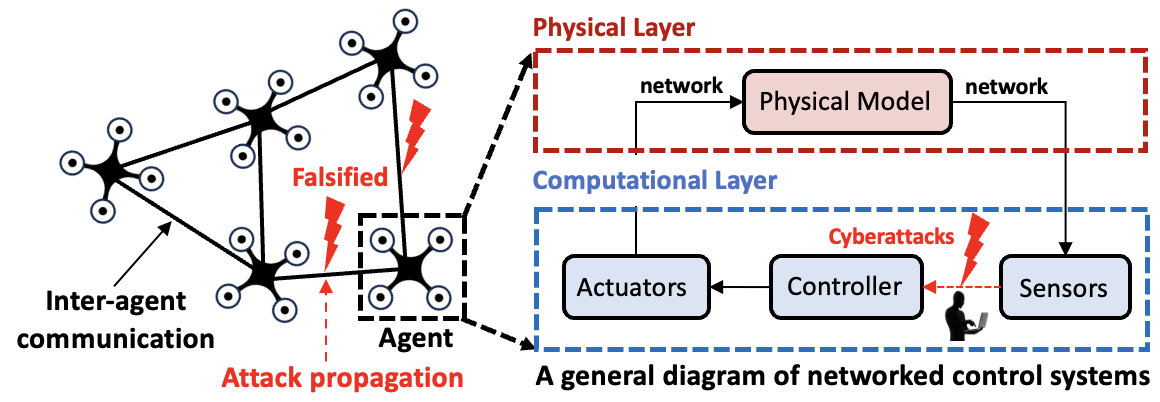
The following is the summary of our ongoing research:
Reactive Multi-Agent System Defense Strategy
Research Objective:
In this research topic, we aim to design resilient control and estimation algorithms that can directly mitigate the impact of adversities. To this end, we developed resilient sensor fusion and estimation algorithms that can filter out the malicious data/information embedded in measurement output. The following videos show the realistic UAM operation in Greater Atlanta with four AVs conducting reference tracking control with formation flight. The left video shows the off-nominal UAM operation with a high risk of collisions. However, the right video shows the resilient UAM operation using our proposed method with high-assured safety.
Publication:
Sounghwan Hwang, Minhyun Cho, and Inseok Hwang, "An Observer-Based Resilient Control Strategy for Leader-Follower Multi-Agent Systems Under False-Data-Injection Attacks", 2024 Midwest Workshop in Control and Game Theory, April 27-28, 2024, Northwestern University, Illinois, USA.
Sounghwan Hwang, Minhyun Cho, Guanlin Wu, and Inseok Hwang, "Resilient Tracking Control For Leader-Follower Multi-Agent Systems Against Sinusoidal Sensor Attacks: An LMI-Based Framework", IEEE Control Systems Letters, June. 2025.
Proactive Multi-Agent System Defense Strategy
Research Objective:
In this research topic, we focus on developing security metrics for multi-AVs that can measure the potential risk (e.g., collisions) by stealthy attacks. We specifically utilize an over-approximated ellipsoidal reachable set through the Lyapunov stability criterion. This reachable set (red-shaded ellipsoids) indicates the level of performance degradation (e.g., trajectory deviation) posed by attacks at certain future time steps. If there are overlaps between reachable sets, we can identify that associated AVs may have potential risks in terms of collisions during operation.
Publication:
Sounghwan Hwang, Minhyun Cho, Sungsoo Kim, and Inseok Hwang, "An LMI-Based Risk Assessment of Leader-Follower Multi-Agent System Under Stealthy Cyberattacks", IEEE Control Systems Letters, vol. 7, pp. 419-2424, 2023 (also presented at the 62nd IEEE Conference on Decision and Control).
Minhyun Cho, Sounghwan Hwang, and Inseok Hwang, "Risk Assessment of Multi-Agent System Under Denial-of-Service Cyberattacks Using Reachable Set Synthesis", 2024 American Control Conference (ACC), pp. 1293-1298. IEEE, Toronto, Canada, July. 2024.
Sounghwan Hwang, Minhyun Cho, and Inseok Hwang, "Proactive Risk Assessment of Multi-Agent Transportation Systems via Reachability Analysis against Stealthy Attacks", Submitted to the book chapter for Advances in Transportation Cybersecurity and Resilience in World Scientific Publishing.
Safety-Critical Control and High-Assured Safety for Unmanned Aerial Vehicles
One of the key aspects of researching Unmanned Aerial Vehicles (UAVs) is how to enhance or fully guarantee their operational safety? UAVs are particularly vulnerable to various malicious threats, such as disturbances, wind gusts, and cyberattacks. For example, in terms of cybersecurity, GPS sensors on UAVs can be easily compromised by cyberattacks, leading to significant degradation in operational performance, such as tracking a destination. To address this challenge, we aim to develop safety-critical control and assurance algorithms to enhance the operational safety of UAVs.

The following is the summary of our ongoing research:
Risk Assessment for UAVs under GPS Spoofing Attacks
Research Objective:
In this research, we develop a model-based risk assessment methodology for quadrotor UAVs under GPS spoofing attacks. These attacks represent particularly severe cyber threats due to their covert nature, allowing them to significantly degrade system performance without triggering alarms. To address this challenge, we propose a reachability-based security metric to quantify the extent of performance degradation caused by potential stealthy attacks. This methodology can be applicable to UAV tracking control operations in urban-like environments, where GPS sensors are highly susceptible to compromise by attackers.
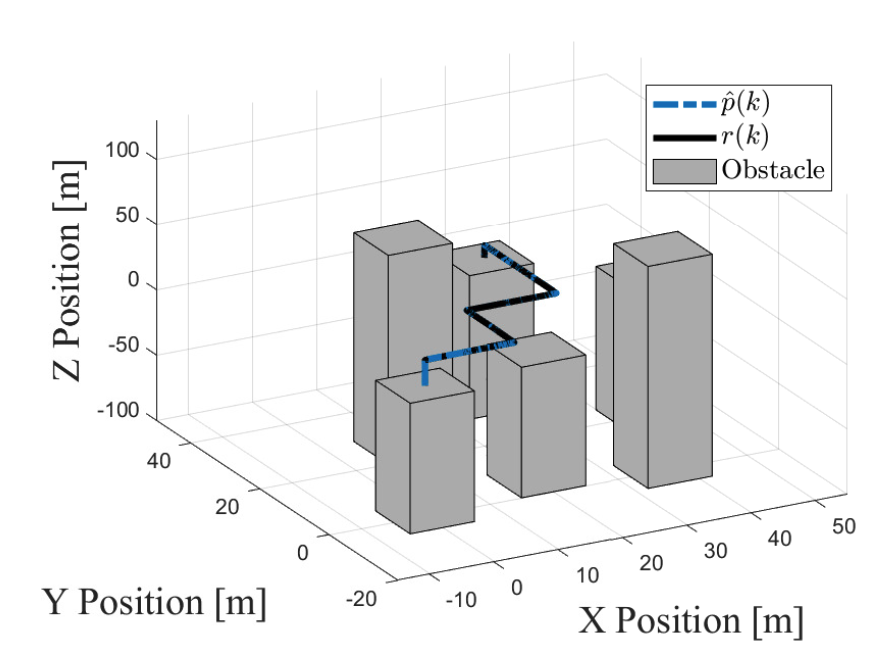
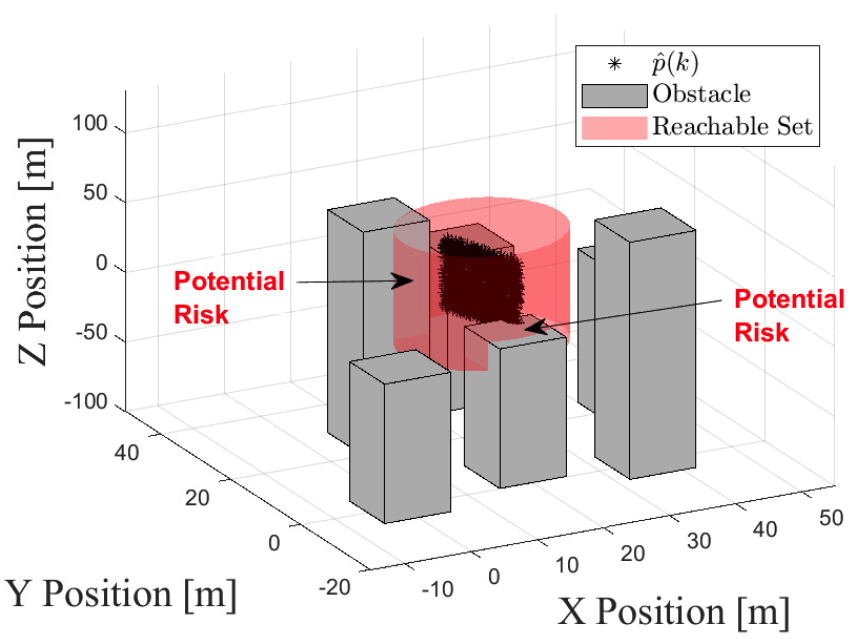
Publication: To be appear
UAV Safety-Filter Design through Control Barrier Function
Research Objective:
This research propose a safety-critical controller for nonlinear affine systems under actuator cyberattacks and model uncertainties. The approach combines a robust sliding mode-based control barrier function (SM-CBF) to address model uncertainties and an LSTM-based attack detector to identify compromised actuator channels. Conventional CBF controllers are sensitive to model dynamics, leading to safety violations under uncertainties and attacks. The proposed SM-CBF ensures safety despite these challenges, while the LSTM-based detector swiftly identifies compromised inputs. The methodology's effectiveness is demonstrated through quadrotor UAV stabilization in a high-fidelity simulator with Gazebo and PX4-ROS2.
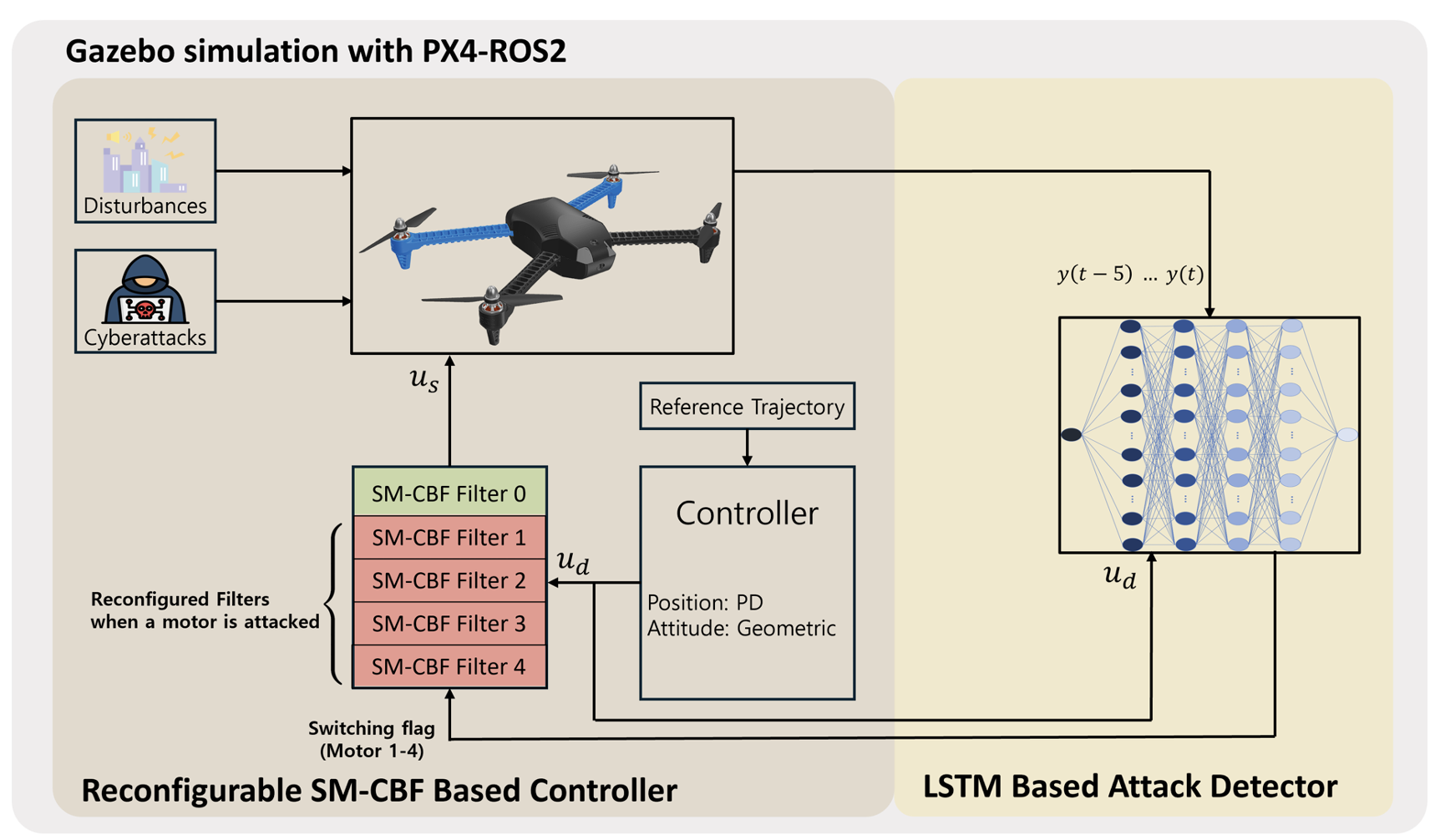
Publication:
Sungsoo Kim, Minhyun Cho, Sounghwan Hwang, and Inseok Hwang, "Safety-Critical Control for Nonlinear Affine System With Robustness and Attack Recovery", AIAA SciTech 2025 Forum, Orlando, Florida, Jan 2025.
Tracking Control for Unmanned Aerial Vehicles using Fuzzy Model-Based Intelligent Control
Unmanned Aerial Vehicles (UAVs) exhibit highly nonlinear and strongly coupled dynamics among attitude, altitude, and position states, making precise control inherently challenging. Conventional controllers (e.g., PID controllers) often fail to handle such nonlinearities and time-varying flight conditions effectively. To address these challenges, a fuzzy model-based intelligent control framework offers an efficient solution by approximating complex dynamics with a set of local linear models and adaptively blending them through fuzzy inference. This approach enhances robustness and adaptability across various flight modes. The effectiveness of this human inference-inspired control strategy is demonstrated through tracking control of a quadrotor UAV.
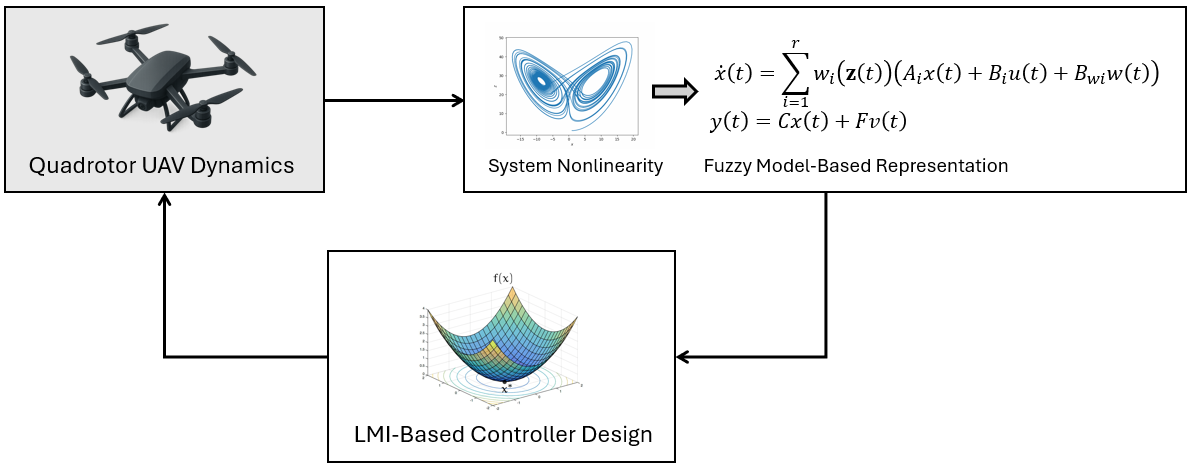
Publication:
Sounghwan Hwang, Minhyun Cho, and Inseok Hwang, "LMI-Driven Tracking Control of Fuzzy Nonlinear Cyber-Physical Systems: Application to Quadrotor UAVs in Urban-Like Environment", AIAA SciTech 2026 Forum, Orlando, Florida.